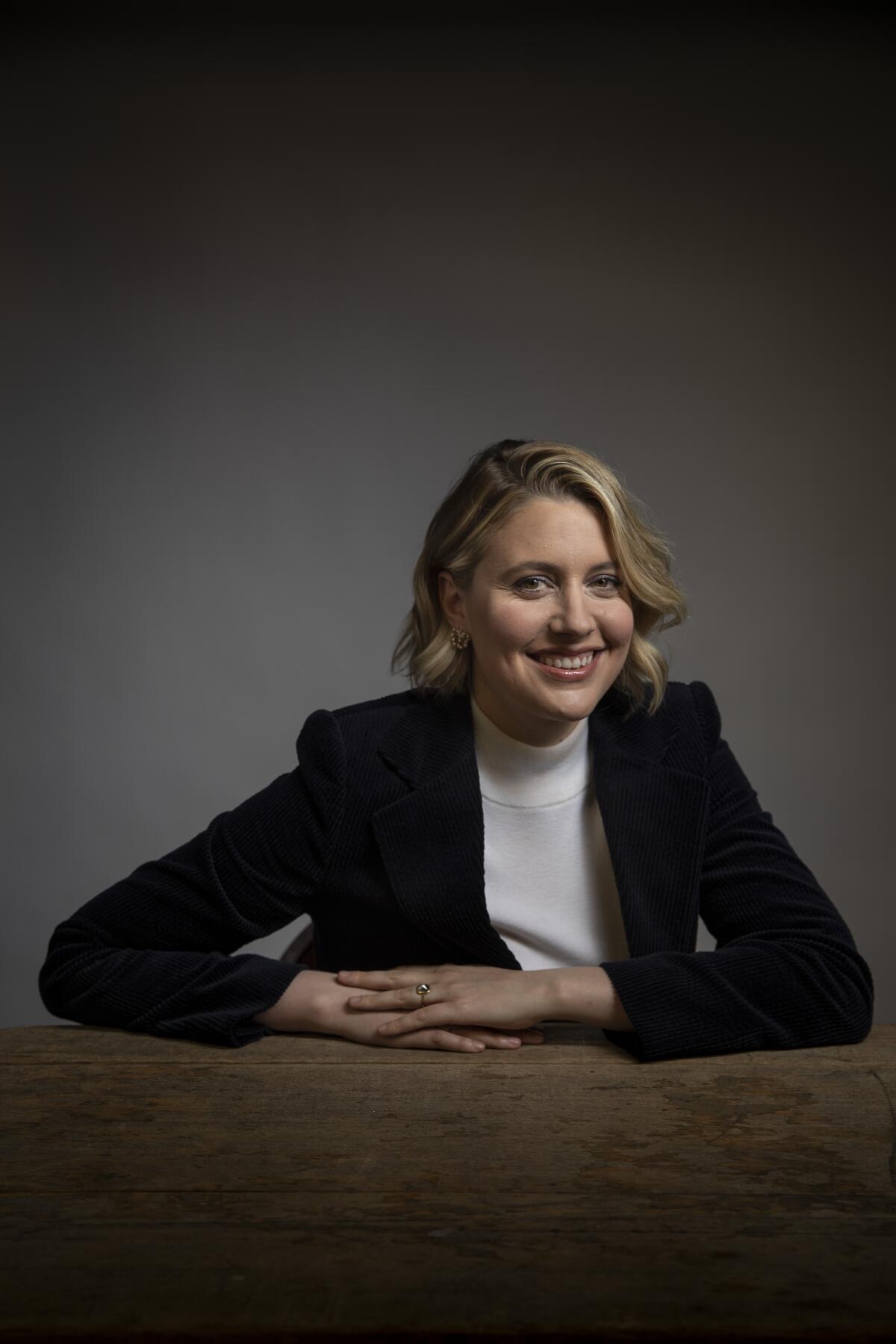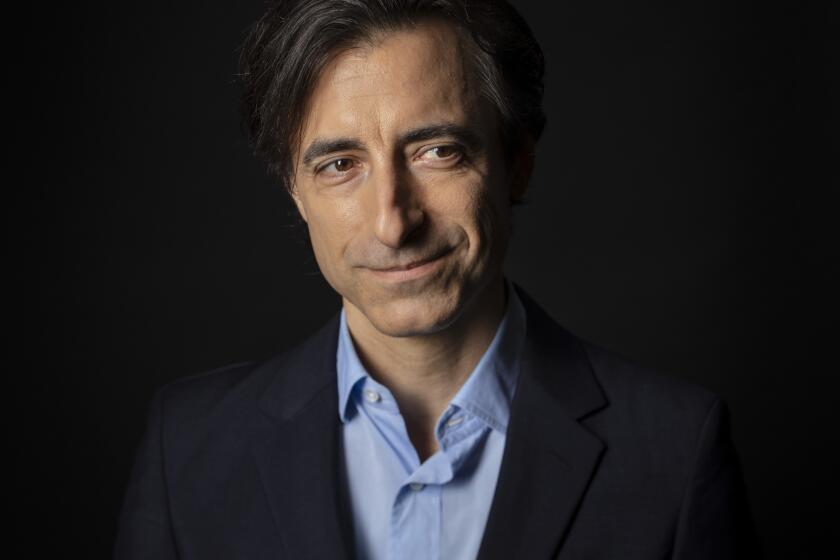Greta Gerwig had the perfect ending for ‘Little Women.’ Here’s why she kept it a secret

- Share via
Greta Gerwig knew how to end her new adaptation of “Little Women,” the eighth film version of Louisa May Alcott’s classic girlhood novel. She also knew not everyone would like her idea, so she decided to shoot it surreptitiously, betting she could pull it off.
Judging from the early reviews of the film, which will open Christmas Day, she did — though that doesn’t mean the experience wasn’t a little nerve-racking.
“You know how with each new draft of a script you have a different paper color ... so you have the pink draft, the blue draft, the green draft, and it goes to everybody, and you have the possibility of a bunch of notes?” Gerwig says. “This was just one of those things where I thought, ‘I know what I want to do here. And I don’t want to debate it. I want to just do it.’”
The 1868 novel about the March sisters — Meg, Jo, Beth and Amy — ends with the headstrong, spirited Jo giving up writing, marrying, having children and opening a school. But in real life, Jo’s creator, Alcott, never married, never had children and continued writing, becoming a wealthy and famous author. “Jo should have remained a literary spinster,” Alcott wrote later.
Gerwig thought she could close her “Little Women” by blending the two narratives, creating a movie within a movie that delivered the pleasures of a romance inside a story about Alcott realizing her artistic ambitions.
Gerwig did share her bold, meta approach with producer Amy Pascal, who had started developing a new adaptation of “Little Women” several years ago while she was running Sony Pictures. But that was pretty much it. Gerwig was flying solo in this follow-up to her Oscar-nominated “Lady Bird,” “betting the farm,” as she puts it, that it would turn out OK.
She cut it close, too. Gerwig, 36, finished shooting “Little Women” on Dec. 16, 2018. She returned home to New York and began editing it the following day. Other than Christmas and New Year’s, she and editor Nick Houy worked nonstop, setting up a New York screening for Sony studio executives on March 10.
Three days after that unveiling, Gerwig gave birth to a son, Harold, her first child with her partner, filmmaker Noah Baumbach.
Noah Baumbach pulls from life -- his and others’ -- for the highs and lows of the Adam Driver and Scarlett Johansson relationship in ‘Marriage Story.’
“I had a ticking clock!” Gerwig says, nibbling truffle fries at a recent lunch interview. She arrived at the restaurant wearing a floral skirt and a navy top that perfectly matched her Converse Jack Purcells. Her hair was still wet because, as she reveals, “it’s always wet these days,” one of the byproducts of promoting a film while caring for an 8-month-old.
Not that she’s complaining. “It’s so wonderful, because he doesn’t care about anything except for can I feed him and what are we doing,” Gerwig says. “He’s a great little guy. It’s like Christmas morning every day.”
But back to that first screening, which took place 72 hours before Gerwig welcomed her son to the planet. Were there notes about that ending?
“They had some questions, yes,” Gerwig says, laughing. “My argument was that I’m not standing outside the romance. I’m not saying, ‘What’s wrong with you people that you want that?’ I want it too! I want them to kiss! And even though in the movie, it’s constructed that it’s fiction, I’m still satisfied when they kiss.”
Indeed, in the scene when Jo (played by Saoirse Ronan) runs after Friedrich (Louis Garrel), Gerwig pulls out all cinematic signifiers of romance — the rain machines and the backlights and the camera crane and cymbal crash and rolling thunder — heightening them just a touch. Gerwig’s joy in the scene’s emotional content is obvious in its construction. But she had more she wanted to say with the movie.
“She told Amy [Pascal] that the film was about art and money,” Ronan says, calling from London. “I can’t imagine too many people having the guts to go into a major American studio and say something like that about ‘Little Women.’” Noting her confidence on their first collaboration, “Lady Bird,” Ronan adds that “she’s owning that even more. She’s the hottest director in town, and everyone wants to work with her and they absolutely should.”
When Gerwig first met Pascal about “Little Women” in 2016, she was primarily known for her work as an actress in independent films made by Baumbach and Joe Swanberg. That didn’t stop her from telling Pascal that she was the only person who could write this new adaptation. Gerwig got the job and, after the success of “Lady Bird,” she was hired to direct it too.
Noah Baumbach, Greta Gerwig, Marielle Heller, Bong Joon Ho, Todd Phillips and Lulu Wang share filmmaking tips, inspirations — and one big secret that’s still being kept.
The day after attending the 2018 Oscars as a double nominee, Gerwig packed months of research into the backseat of a rental car and drove up the coast to Big Sur, a favorite place, where she had rented a tiny cabin through Airbnb. She slyly refers to the trip as a “pretty romantic journey to the woods with myself.”
Gerwig began each morning with a scone and coffee at Big Sur Bakery and soon struck up friendships with the locals. She went to a child’s birthday party. She grooved on the mystical vibe. And she set about to craft an emotional, cubist film that merged Alcott, Jo and herself in a way that tapped into the ways that “Little Women” had spoken to readers for 150 years.
When Gerwig showed the finished product to her agent, Jeremy Barber, he told her he found it more personal than “Lady Bird,” a coming-of-age about a young woman, like Gerwig, who hailed from Sacramento.
Gerwig believes Barber’s reaction is tied to the authorship question she explores in the film. Her “Little Women” opens with Jo shyly entering a publisher’s office, looking to sell a story on behalf of a “friend.”
“I lifted 90% of the dialogue straight from the book, but there was something about the language, her hesitancy, her willingness to change the work to get the money ... all of that, I just knew through and through,” Gerwig says. “I felt it could be me talking to a studio head. It has been me talking to a studio head.”
Those conversations, Gerwig says, are reflected in an exchange between Jo and Amy that gets to the heart of why she wanted to make this movie. Amy asks her sister what she’s writing. Jo replies that she’s started something, but she doesn’t think it’s any good. Elaborating, Jo explains: “It’s just about our little lives. Who would care about a story of our domestic struggles and joys? It doesn’t have any real importance.”
“Writing them will make them important,” Amy answers.
“What you choose to tell and how you choose to tell it indicates to an audience what’s important,” Gerwig says. “I wanted to make this ‘Little Women’ 30 feet tall. I wanted to shoot it on film. I wanted it to have these amazing actors and collaborators. I wanted to give it the works because I wanted to say it matters.”
Gerwig did all those things, assembling a cast that included Ronan, Laura Dern, Meryl Streep, Florence Pugh, Timothée Chalamet, Emma Watson and Eliza Scanlen. She exhaustively researched Alcott’s life and pushed her audience to reconsider their ideas about familiar characters. The film’s treatment of Amy, played by Pugh, is particularly nuanced, transforming the sister usually viewed as a brat into a clever, witty and, yes, stubborn young woman, the equal of Jo.
“When I was making the movie, someone asked, ‘Why did you agree to play the worst sister, the one that burns the book and goes off with the rich, beautiful man?’” Pugh remembers. “And I said, ‘How fun is it to play a character that people already hated and make them feel otherwise?’”
Pugh and Ronan speak of Gerwig with an admiration that occasionally borders on awe. Ronan uses “Greta” as both a noun and adjective; Pugh, marveling at Gerwig’s precision with language, says, “It’s almost like she invented talking.”
Yet there’s no pretense about the woman. Ronan loves to watch Gerwig on set because she becomes so “happy and giggly” after a good take. “She’s not trying to be cool or edgy or art house,” Ronan relates. “She gets absolutely pumped when you nail a scene.”
And though Gerwig notes that Ronan is “really good at taking the piss out of me,” it’s not like she possesses a trace of self-importance. Following the first Los Angeles screening of “Little Women” in October, the cast came on stage for a Q&A at the ArcLight in Hollywood. Gerwig walked out last, took in her ovation, sat down and promptly fell off her chair. She thought it was hilarious.
“It’s so infectious to be around someone like that,” Ronan says, “someone who’s admired so much, who has humanity in bucketloads, and she falls off her chair and she can laugh about it. It just makes you love her all the more.”
More to Read
Only good movies
Get the Indie Focus newsletter, Mark Olsen's weekly guide to the world of cinema.
You may occasionally receive promotional content from the Los Angeles Times.












